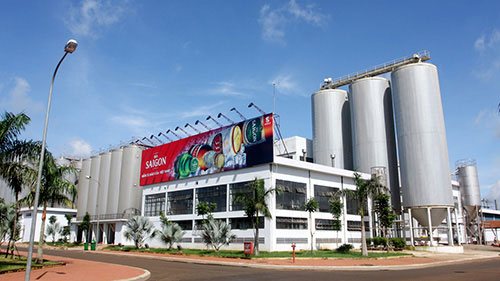
Profit at Its Lowest Point
Sabeco, originally a small brewery founded by the French in 1875 in Saigon, became officially listed on HoSE in 2016. Today, Sabeco is the leading beverage group in Vietnam, holding the second largest market share at 34%. The company owns several strong brands such as Saigon Special, 333, and Saigon Lager, and boasts a widespread distribution system with subsidiaries across the country. Sabeco ranks first in the number of breweries (26 factories) with a capacity of 2.4 billion liters per year and has 11 trading companies managing over 600 distributors. This is a significant advantage over competitors like Heineken, which has only 6 breweries and 8 sales offices.
Despite these advantages, Sabeco's production and business activities have plummeted over the past three years. The company's weak business results stem from various factors, including a reduction in consumer spending on non-essential goods in a challenging economic context, decreased consumption due to the tightening of Decree 100/2019/ND-CP, an increased sales spending-to-revenue ratio to boost market awareness and protect market share, and the use of high-priced imported raw materials in 2022.
In 2023, Sabeco recorded net revenue of VND 30,461 billion, a decrease of 12.9%, and a profit after tax of VND 4,255 billion, down 22.6%. In the first quarter of 2024, Sabeco reported a profit of less than VND 950 billion, a 9% drop. This marks Sabeco's lowest profitable quarter since the fourth quarter of 2021. For the entire year, Sabeco's revenue and profit in 2023 were lower than in 2016, before the company was acquired by ThaiBev.
2017 was a historic year for Sabeco when ThaiBev successfully acquired the company for USD 4.8 billion through Vietnam Beverage. This acquisition was a record deal for the Asian beer industry at the time. Post-acquisition, Sabeco continued to grow, achieving revenue of VND 37,999 billion in 2019, before being affected by the Covid-19 pandemic and Decree 100.
Decline in Stock Value
Sabeco’s unsatisfactory business results have also impacted its stock value. In mid-April, SAB shares dropped close to the VND 52,000 mark, the lowest in the company's transaction history. Compared to the VND 320,000 per share price that ThaiBev paid in 2017 during the Ministry of Industry and Trade's divestment, this represents a significant loss for Thai billionaire Charoen Sirivadhanabhakdi. It is estimated that the Thai billionaire spent about USD 4.8 billion to buy 343.6 million SAB shares from the Ministry of Industry and Trade and is now facing a temporary loss of about USD 3.5 billion after nearly seven years.
This comparison might be somewhat "lame" because ThaiBev's investment in Sabeco was made with a long-term vision, aiming to dominate the Vietnamese beer market and use it as a springboard towards Southeast Asia. Therefore, a temporary loss on this investment is not considered a major issue.
According to Nikkei, during a press conference in Thailand in September 2022, a representative of ThaiBev’s leadership described Sabeco as a "precious gem," a rare asset among brewers in Southeast Asia. The Thai billionaire's losses have been mitigated somewhat by the cash dividends that Sabeco regularly pays to shareholders. It is estimated that since 2017, ThaiBev has received nearly VND 9,300 billion (equivalent to USD 360 million) in dividends from Sabeco.
Unclear Recovery Signals
According to the first-quarter financial report, Sabeco's net revenue reached VND 7,180 billion, up 15.6%, and profit after tax reached VND 1,020 billion, up 2%. With this result, SAB has ended the trend of decreasing profits since the third quarter of 2022. One factor contributing to Sabeco's positive growth was the revenue from the Lunar New Year, recorded in the first two months of the year.
However, Sabeco’s gross profit margin remains low due to high input costs. Specifically, the gross profit margin in the first quarter of 2024 was 160 basis points lower than the same period in the previous year and 60 basis points lower than in 2023. In response, Sabeco’s leadership has made efforts to improve production efficiency to push the gross profit margin higher than 29.8%, the figure for the previous year.
Additionally, Sabeco has implemented a policy of cutting advertising and promotion costs to their lowest levels since the first quarter of 2022. However, in a highly competitive market with strong foreign competitors, Sabeco's policy of tightening advertising and promotion expenditures may lead to a decline in revenue, thereby affecting its efforts to improve manufacturing and business operations.
While Sabeco is showing some positive signals in revenue, analysts caution that it is too early to confirm that the company's business activities have passed the bottom. In fact, average revenue from the fourth quarter of 2023 to the first quarter of 2024 is still 3.3% lower than the figure from the fourth quarter of 2022 to the first quarter of 2023. This decline is partly due to increased alcohol testing becoming common practice, raising the costs associated with alcohol consumption and potentially creating new consumer behaviors that could hinder the recovery of the domestic beer market.
In summary, Sabeco faces significant challenges despite some signs of recovery. The company’s future performance will depend on its ability to navigate these challenges, improve production efficiency, and adapt to changing market conditions.




















